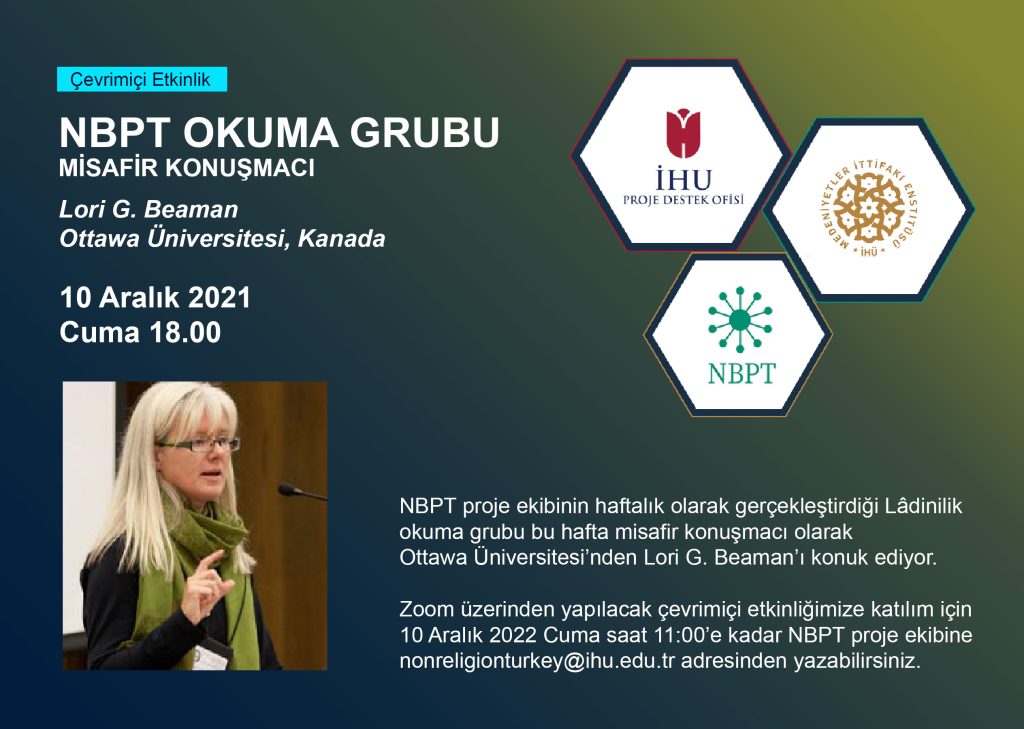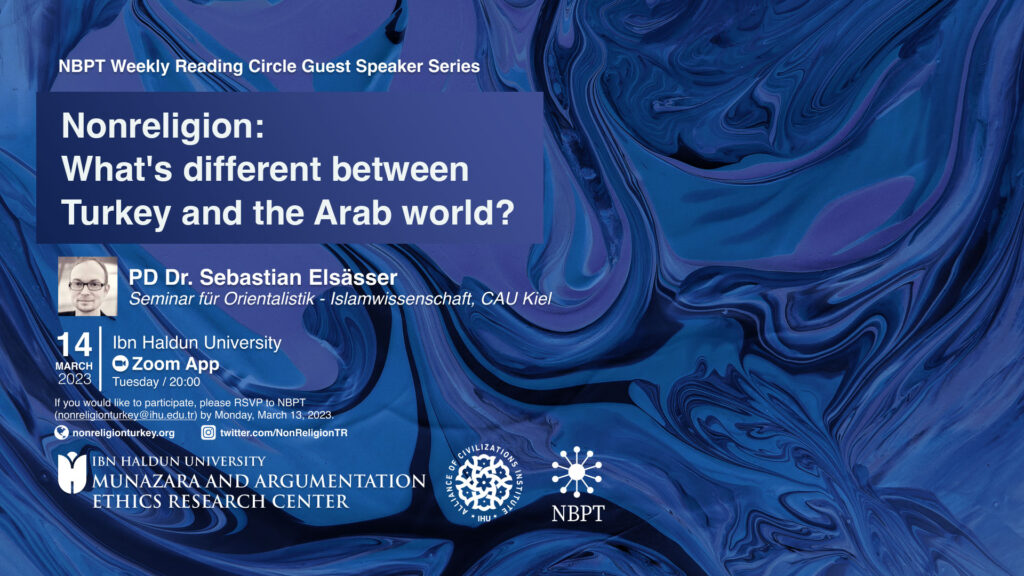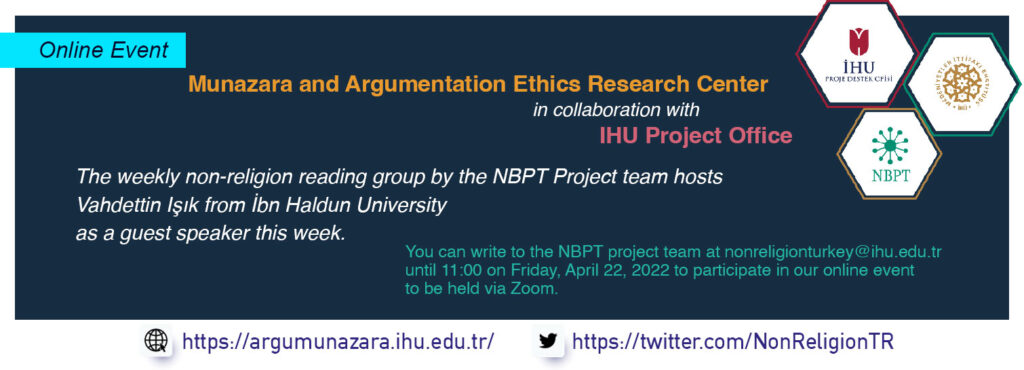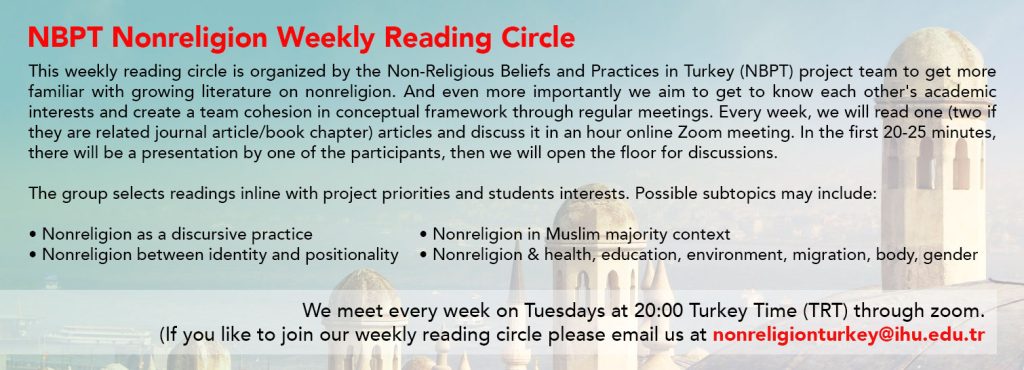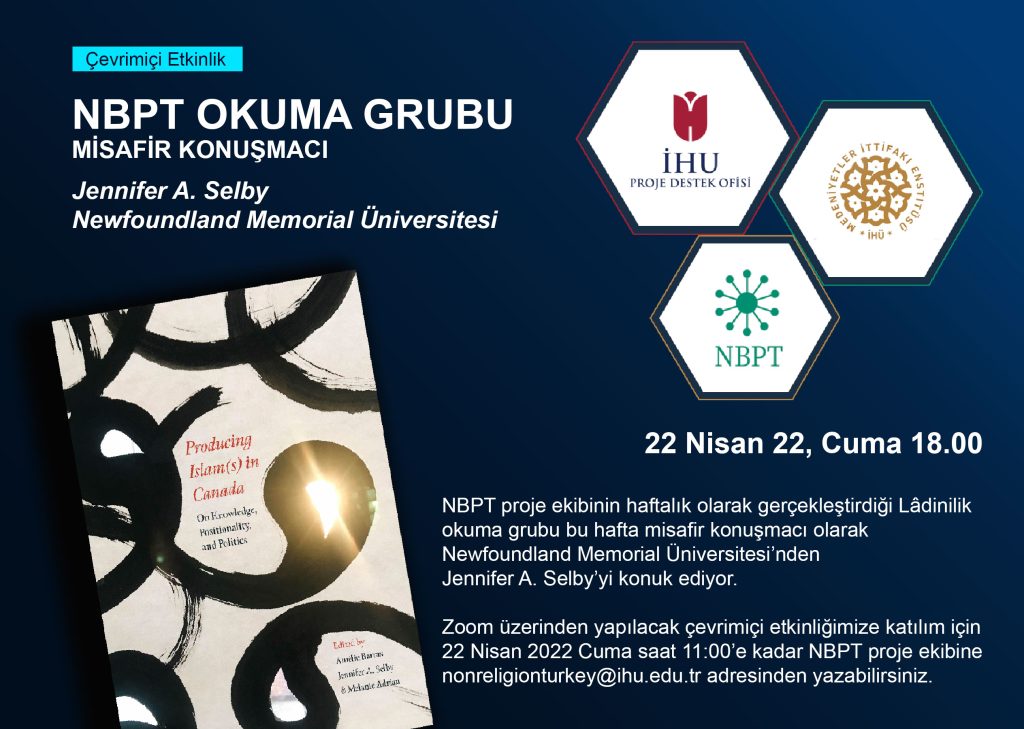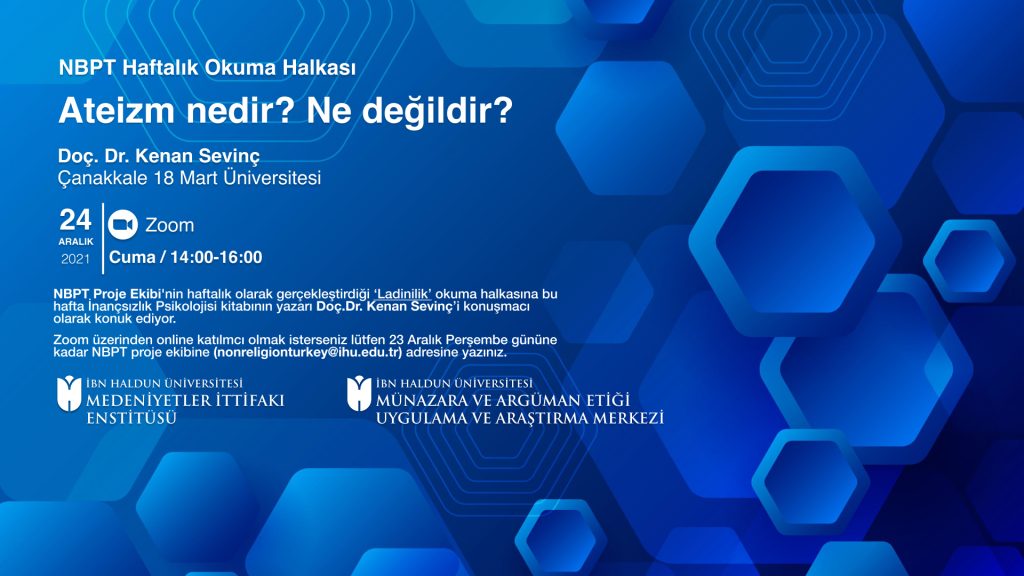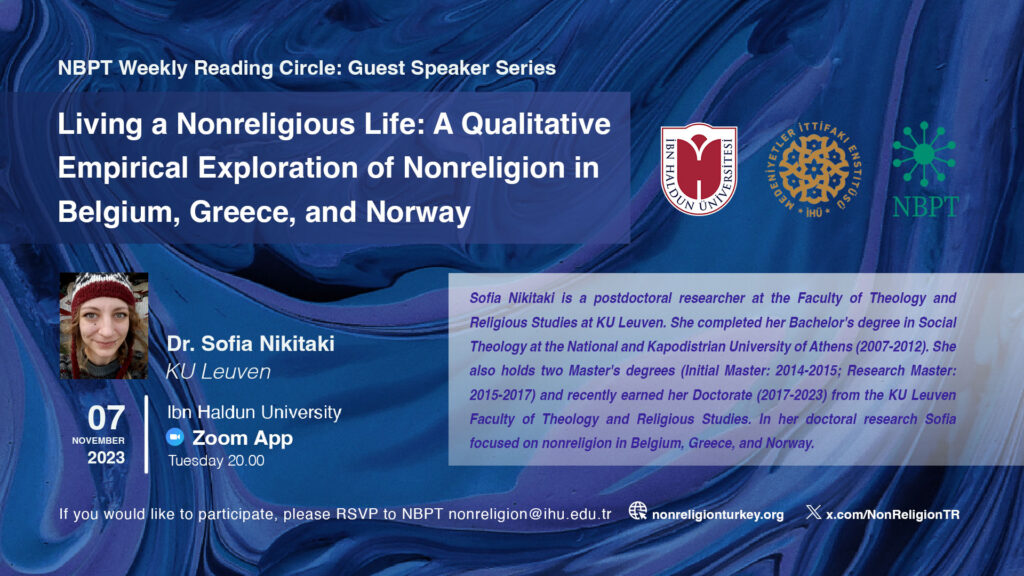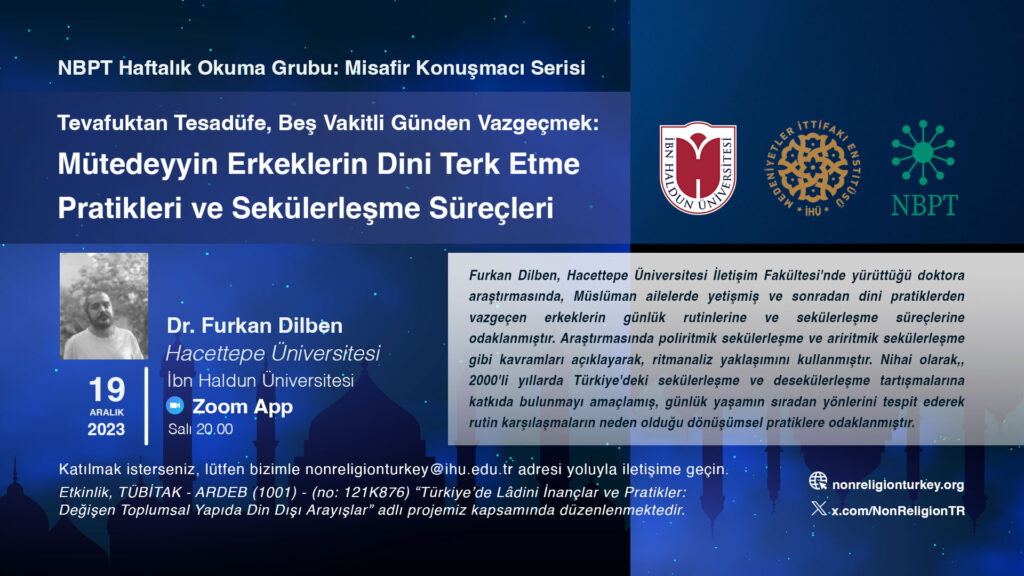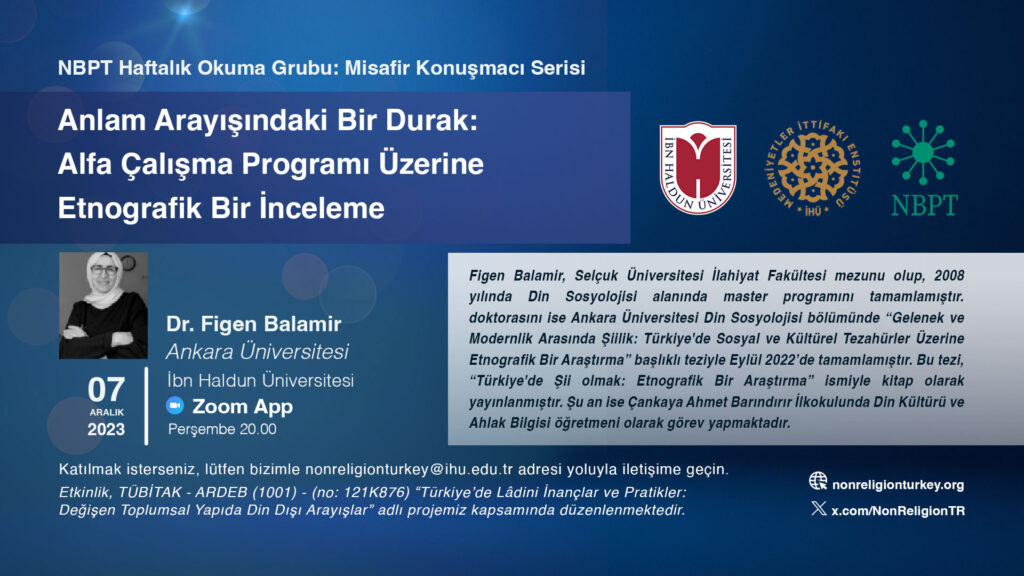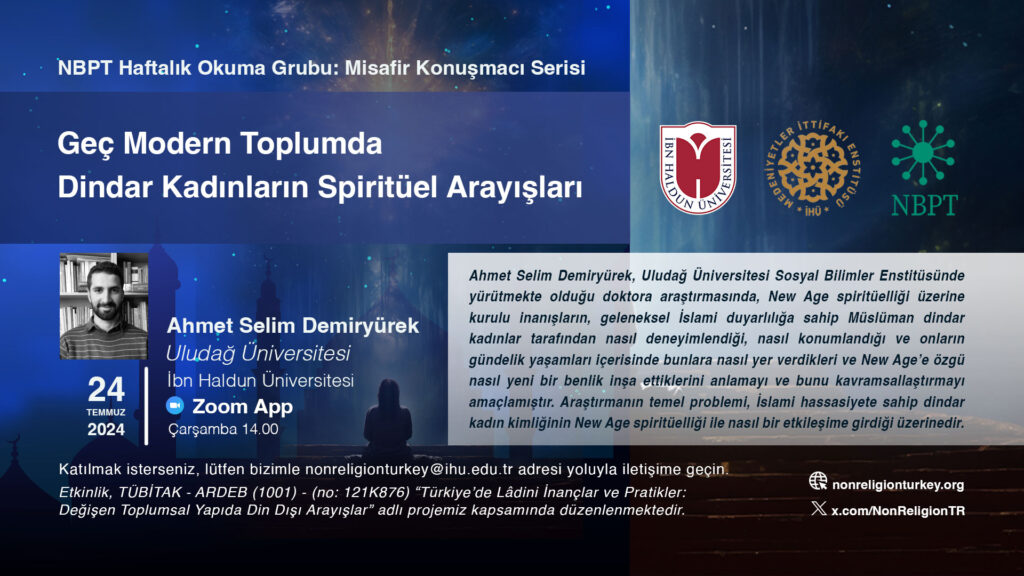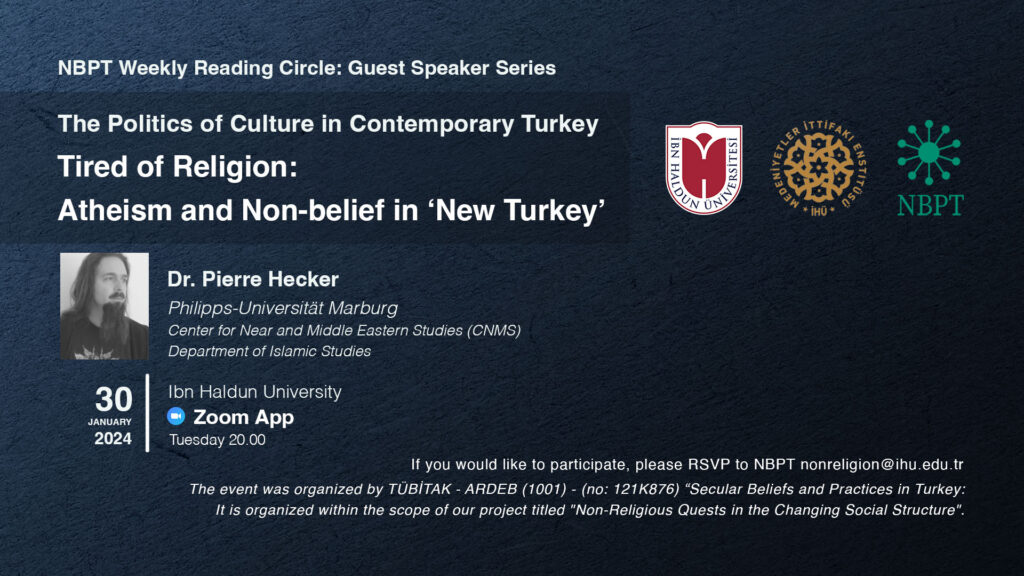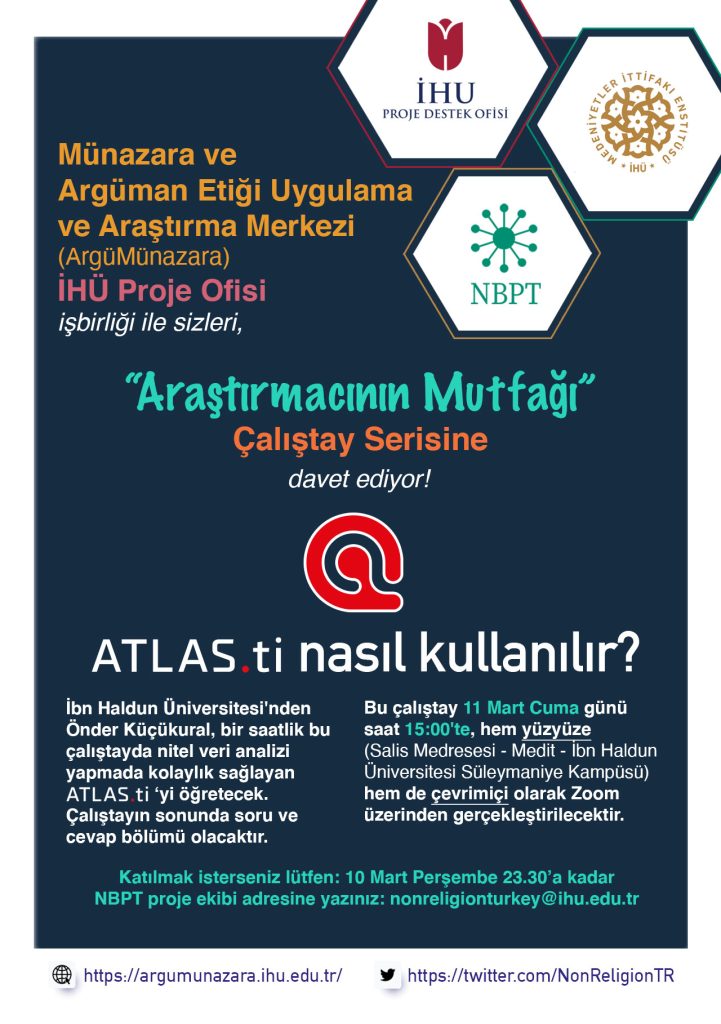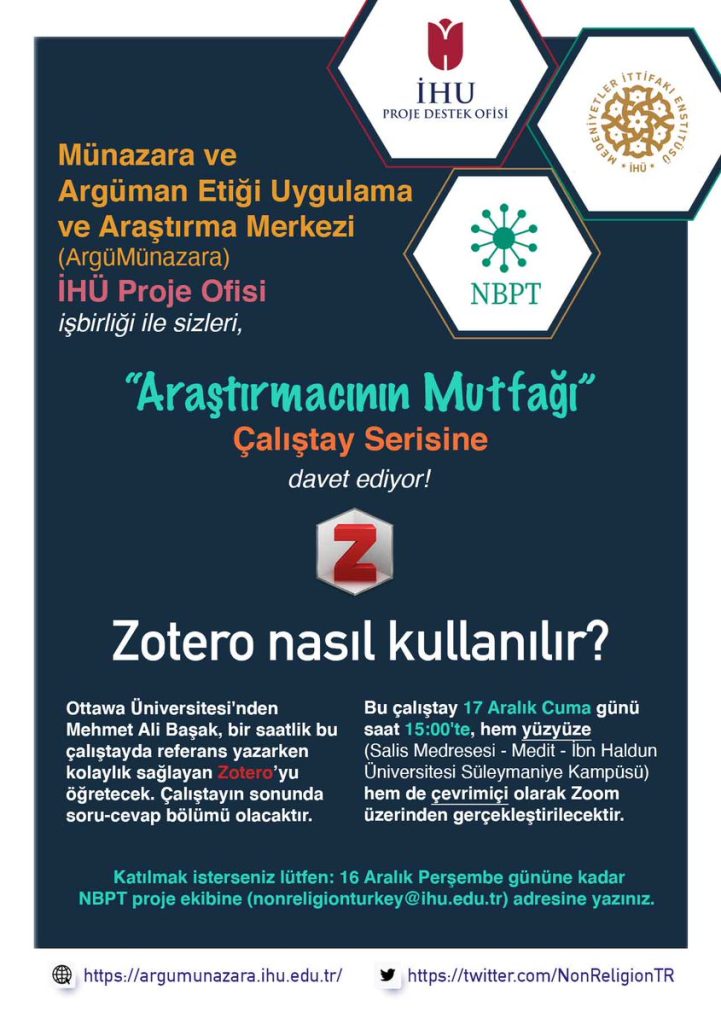PAST EVENTS
CONFERENCES
Nonreligion and Secularity Research Network Conference, University of Ottawa, Canada, 6-9 June, 2023
Our Project Team presented their research papers at 2023 Nonreligion and Secularity Research Network Conference, University of Ottawa, Canada, 6-9 June, 2023
Title of the Session: Exploring Nonreligion in Turkiye
Abstract of the session: This session aims to share the preliminary findings research project “Nonreligious Beliefs And Practices in Turkiye” funded by Scientific and Technological Research Council of Turkey (TUBİTAK). The project started on 15 November 2022. So far, we interviewed 55 individuals in seven cities all across Turkiye. It seems nonreligion is not a reserved domain of secular segments of the society anymore as increasing numbers of sympathizers are seen even among the children of conservative Muslim families. The issue is more complex than being captured only as an ‘identity’ but it demands a new perspective that embraces relational aspects of the phenomenon, everyday life experiences and practices, and researchers’ own self-reflexive accounts. The papers in this panel have not been concluded yet but are products of our year-long intensive debates within our project team.
The session chair and organizer: Dr. Önder Küçükural, Munazara and Argumentation Ethics Research Center, Ibn Haldun University, Istanbul, Turkiye onder.kucukural@ihu.edu.tr
Önder Küçükural and Mehmet Ali Başak will be present in person for the conference. The other presenters will apply for the visa, depending on the budget and the visa process, they may also be present in-person. But in any case, we may need to resort to a hybrid format.
We are proposing four papers below.
1. Feeling the Field: Encounters Between the Opposites
Betül Tozlu, Ibn Haldun University, Department of Sociology, PhD Student
Zeynep Aslan, Istanbul University, Department of Sociology of Religion, PhD Student
As a part of the project “Nonreligious Beliefs and Practices in Turkiye”, we have been conducting in-depth interviews in seven big cities in Turkiye. Getting to know people in one-to-one conversations in a safe space is known to create an intimate relationship between the researcher and the interlocutor. In the case of interviews on nonreligiosity, having women wearing hijab in the research team made our study different from the previous studies conducted in Turkiye. Some of our interlocutors had never sat and chatted with a veiled woman before, despite the fact that Turkiye is a Muslim-majority country where women in hijab are visible and part of the social sphere. This turned the context of the in-depth interviews itself into a topic of discussion and contemplation. Most of the time, finding a space for themselves to prove their ‘righteousness’ and worldviews in front of a person who is wearing a religious symbol seemed to be changing the tone of the interviewee. Affirming one’s worldview (in our case nonreligiosity) in front of “the other” (in our case religiosity) seemed to be posing a challenge not only for our interlocutors but also for the interviewers as this changed the way they choose to interact with the interviewer in the interview context. In this article, we will analyze the data from a self-reflexive point of view, and will explore the dynamics that arose during these encounters.
Keywords: nonreligion, Muslim women, self-reflexivity, the other
2. The Politics of Nonreligiosity: Agency, Resistance and Negotiation in the Process of Leaving Islam
Nesibe Demir, Ibn Haldun University, Department of Sociology, PhD Student
Zeynep Kübra Kılıç, Ibn Haldun University, Department of Sociology of Religion, MA Student, zeynep.kilic@stu.ihu.edu.tr
In recent years, there have been discussions about the increase in non-religious tendencies such as atheism and deism, particularly among young people in Turkiye, compared to previous periods. Especially during the rule of a government that openly expressed its goal of “raising a pious generation”, such speculations or data began to occupy the public’s agenda more. Moving out of Islam is not just about leaving the faith but also related to belonging (Van Nieuwkerk 2018) and the whole fields where social, political or gender relations intersect (Vliek 2019). Thus, in a Muslim-majority context, complex issues brought by the idea of moving away from Islam was inevitable. The individuals who reject ‘their religion’ are faced with the danger of losing their family, friends, and social environment, and risk being excluded from society. That is why, while individuals manifest their agency in expressing their opposition by resisting religious discourses and practices, they adopt a more reconciling attitude in certain situations. Based on qualitative research on nonreligious individuals in Turkiye, this paper reveals in which areas this resistance or negotiation emerged. This paper claims that while individuals have more radical decisions and practices in their private spheres, they often try to seek ways for negotiation in social or public spheres, that is they follow a politics of nonreligiosity.
Keywords: Islam, nonreligion, exclusion, agency, negotiation, Turkiye
3. The View of Religious Education in Turkiye
Elif Yönden, Ankara University, Department of Sociology, MA Student
Dr. Kurtuluş Cengiz, Ankara University, Department of Sociology
‘Religious education’ is a compulsory course for primary and secondary school students in Turkiye. However, studies show that compulsory religious education is often used as a propaganda tool for Sunni Islam, is not inclusive, and creates discrimination against minorities (Genç et al. 2017, Yıldırım 2021). This is also clearly stated in the report “Compulsory Religious Education in Turkiye: A Human Rights-Based Evaluation of Religious Culture Ethics Lesson and Books” published within the scope of the project carried out in cooperation with the Association for Monitoring for Equal Rights (ESHID) and the Norwegian Helsinki Committee (NHC). The Atheism Association in Turkiye launched a petition on the change.org website demanding the compulsory religion course to be abolished. Similarly, The Freedom of Belief Initiative also launched a campaign called #OurLessonIsNotReligionReligionsandBeliefs.This article aims to discuss what compulsory religious education means for nonreligious citizens based on a qualitative field search conducted in seven different regions of Turkiye with seventy nonreligious individuals.
Keywords: Religious Education, Turkiye, Discrimination, nonreligious people
4. Religious Nones and Aftermath of ‘Dead Body’ in a Muslim Majority Context
Mehmet Ali Başak, University of Ottawa, Department of Classics and Religious Studies, PhD Student , mbasak@uottawa.ca
Hande Gür, University of Alberta, Department of Anthropology, PhD Student
For many religious people, especially followers of Abrahamic religions, death does not seem to be an annihilation or an end, but a transition to a new life (Walter 2008, Bracke and Aguilar 2020). But what about for religious nones? What does a dead body mean to them? Even if they do not believe in the afterlife, do they participate in death ceremonies and rituals in their daily lives? These questions even get more complex as we explore how diverse nonreligious people are (Quack et al. 2009). Based on semi-structured interviews with 20 self-identified nonreligious people living in Turkiye, this paper examines how dead body and post-mortem ceremonies are perceived and experienced by religious nones in Turkiye. It argues that the perceptions and practices of religious nones towards the dead body and afterlife are not uniform. Preliminary findings show that some do not care what happens to their bodies after their death, some desire to be disposed of through non-Islamic methods like cremation, and some others desire to be buried according to Islamic principles even though they do not believe in an afterlife. It also suggests that the attitudes of religious nones towards death and the treatment of the dead body have been influenced by a variety of factors, including cultural and societal norms, personal preferences, and the beliefs of their loved ones.
Keywords: dead body, religious nones, afterlife, death ceremonies
INDIVUAL PAPER PRESENTATIONS
Science as One of the Pillars of the Positive Content of Nonreligion in Turkey
This paper aims to contribute to the scholarly debates on capturing the positive content of nonreligious imaginaries (Stacey and Beaman, 2021). Drawing on the qualitative data we collected through in-depth interviews (55) in seven cities in Turkey, science discourse provides one of the pillars of nonreligion in Turkey. The participants who identify themselves with a wide range spectrum of nonreligion (spiritual but not religious, agnostics, deists or atheist or indifferent or others who are in between, and still others who refrain from any label) tends to appeal to a quasi-scientific worldview (Taves, 2018) in their attempt to explain or account for the big questions. Surprisingly scientific discourse and sensibilities do not only manifest itself only in the cognitive and discursive engagements of our participants, but it also manifests in the performative struggles or imaginaries to underline their distinction from the majority religious other. It informs the ethical, esthetic, and bodily preferences of our participants and can be traced in a wide range of issues such as dietary choices, the definition of beauty, and environmental concerns.
Key words: science, intellectual, freethinker, human-centered worldview
Nazmiye Yağcı, Istanbul University, Ph.D Student in Philosophy of Religion
nazmiyeyagci@gmail.com
Önder Küçükural, Ibn Haldun University, Department of Sociology, onder.kucukural@ihu.edu.tr
Önder Küçükural attended “Religion and its History in Turkey: New Approaches, Alternative Perspectives”, held on January 27-28, 2023 at the DFG-Humanities Group Multiple Secularities, Nikolaistr. 8-10, room 5.55, at Leipzig University.
Nonreligious Imaginaries in the Turkish Context: What is more Banal? Secularism or Religion,
Önder Küçükural, Ibn Haldun University
Lois Lee (2015), in her seminal work “Recognising the Non-religious,” questions “if people do not even notice the nonreligious images and slogans around them, does this not suggest that they are fundamentally indifferent to them and that these don’t really matter?” (p.2) Inspired by Billig’s notion of banality, Lee upholds an alternative view and argues that everyday forms of secularism (she uses nonreligion and subjective secularity interchangeably, I will also follow her) may go unnoticed like dusty flags and they excite little attention, but they can have a profound influence on contemporary culture.
This paper explores similar yet different dynamics in the religion-related field (Quack, 2014) in the Turkish context. The question I want to explore in this paper is “What is banal in the Turkish context? Is it secularism or religion?” The cases and data I use are part of the on-goingfield research on nonreligion in 7 cities in Turkey and funded by TUBITAK.
Following Quack’s (2014) relational approach, I will argue that religion and secularism are made mundane and invisible for some sections of society, while simultaneously eliciting great excitement from other sections. Both these concepts are still polarizing fault lines in the Turkish context. From some of the participants in the field work we heard that both religion and secularism as something which is ‘traditional’, pervasive, normal, and potentially banal. These ideas come out through their assumptions, conflations, and identifications that appear in their discourses and performances. For some other participants on the other hand, the topics of religion and secularism are still fresh. Religion and secularism are still polarizing topics in the context of Turkey. Thus, participant’s position in this polarization seems to determine what they consider banal. An analogy from a slightly different context might help to clarify what I mean. Many official buildings in Turkey have nationalist quotes written on walls. A very common such quote is “Ne mutlu Türküm diyene/ Happy is he who says I’m a Turk.” To a person that identifies as a Turk and resides in Kadikoy, Istanbul this sentence is trivial to the point of being invisible. To a person identifying as a Kurd and residing in Diyarbakır this quote is a reminder of systemically oppressive state practices. In this paper I show that we are dealing with similar undercurrents in the daily practices and symbols of religion and nonreligion/secularism. Data from the fieldwork point to the fact that there are discursive positions and imagineries (Beaman & Stacey, 2021) shaped by either religion or secularism. They are normative, contentious, and vibrant enough to still mold individual and societal ‘identity’ and practice.
References
Lee, L. (2015). “The Unwaved Flag: Everyday and Banal Forms of Non-Religion” Recognizing the Non-religious: Reimagining the Secular. Oxford University Press. https://doi.org/10.1093/acprof:oso/9780198736844.001.0001
Beaman, L. G., & Stacey, T. (Eds.). (2021). Nonreligious Imaginaries of World Repairing. Springer International Publishing. https://doi.org/10.1007/978-3-030-72881-6
Quack, J. 2014. Outline of a Relational Approach to ‘Nonreligion’. Method & Theory in the Study of Religion 26(4–5): 439–469.
